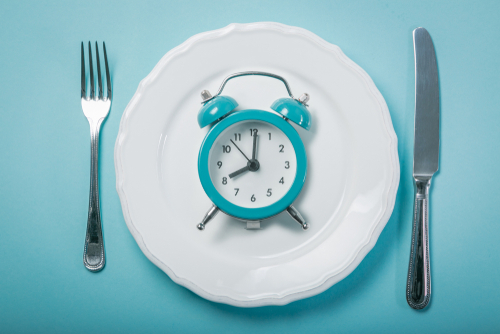Experts Are Recommending the "One Meal a Day" Diet Plan - but Won't it Make You Sick?
It seems like there is a new crash diet on the scene which everyone is ranting and raving about: the OMAD diet. OMAD is short for "One Meal A Day", and the diet is exactly as simple as it sounds: you are only allowed to eat one meal on a daily basis. Some fitness and nutrition experts have dismissed this blasphemy as dangerous and ineffective. Others swear by it, and they have the before and after pictures to prove it. So which side is right, and which side is wrong? Is the OMAD diet a simple, effective, and healthy way to lose weight? Or are you setting yourself up for disaster?
Why People Are in Love With the OMAD Diet
If you sit down and talk to the people who follow a OMAD diet, you'll start to see that it actually has some pretty attractive benefits. Those include:
- It's a time saver. How much time does it take to prepare three square meals (or 4-6 small meals, like weight loss experts recommend) everyday? If you're only eating one meal a day, then you'll be spending at least 66% less time worrying about food. If you batch cook ahead of time, this gets even more convenient.
- Few - if any - dietary restrictions. You don't have to restrict the type of food to eat on the OMAD diet. You can eat vegan, vegetarian, a Standard American Diet, or follow any other meal plan you want. The only thing that matters is whether or not you eat within your one hour food window.
- Better metabolic health. Fasting for 23 hours out of the day provides a ton of health benefits like increased energy, insulin sensitivity, and autophagy. It also dramatically improves your body's ability to burn fat for energy instead of carbs.
- Healthy hormone regulation. If you are significantly overweight, it's not just about consuming too many calories; it's about the hormonal imbalance between ghrelin and leptin, as well as your insulin resistance. Multiple studies have shown that over time, fasting has the potential to reverse these hormonal imbalances and protect against diseases like type 2 diabetes.
But Won't the OMAD Plan Make You Sick?
There is one universal, unfortunate truth about the human body: whenever you try to break your addiction to an unhealthy substance - weather that be cigarettes, alcohol, heroin, or especially sugar - your body will throw a tantrum like a tired toddler who refuses to take a nap. The more used to it you are, the more passionately your body will revolt. The OMAD diet not only forces you to eat less frequently, but most people end up consuming fewer calories (especially sugar and carb calories) in the process.
Most people experience withdrawal symptoms including headaches, brain fog, low energy, dizziness, irritability, and intense hunger cravings when starting a OMAD diet. FYI: the more carb-adapted you are, the worse the withdrawal process will be. These symptoms may make it difficult for you to function normally, especially at work or in the gym. You may have to scale down your current fitness routine or be careful when starting a new one while you adjust. But there is no scientific evidence that fasting diets like OMAD cause any permanent, long-term damage in healthy people. So don't worry; the pain is only temporary!
OMAD (and Fasting) Myths
When it comes to the OMAD diet (and any other fasting diet), there are lots of nasty myths floating around. Granted, there are obvious dangers for people who fast too long and do not eat a sufficient amount of healthy, nutritious foods once they do refeed. But most of the naysayers are trying to argue against it using decades-old, methodologically-flawed science which has been effectively disproven by modern medicine. Those myths include:
- Myth: Fasting sends your body into starvation mode - on the contrary, modern research has discovered that "fasting" and "starvation mode" are two completely different metabolic states. For some people, it can take up to a week or more to enter true starvation mode. For people with a larger body fat percentage, it can take even longer than that.
- Myth: Your body loses muscle in order to preserve fat stores while fasting - this myth, as far as we can guess, comes from the depletion of glycogen stores and loss of water weight which happens during short-term fasting in people who are not fat-adapted. While muscles may appear to shrink in size and density, the truth is that the actual mass of muscle fibers remains the same.
- Myth: Cortisol spikes - cortisol is the stress hormone, and people think fasting raises cortisol levels. But a study published in the Journal of Clinical Endocrinology and Metabolism shows the exact opposite: people in a fasted state subjected to stress test responded with significantly lower increases in cortisol than people who went into the same stress test well-fed.
Granted, we're not trying to say that the OMAD diet it's the best diet out there, or that everyone should be trying it. But based on our research, this diet doesn't seem as crazy or as dangerous as most people think.
Should You Take Supplements While Eating OMAD?
There are a lot of good supplements you can take - and probably should take - if you decide to try the OMAD diet. For starters, multivitamins are key - especially if you don't typically eat nutrient-dense food. You should also think about drinking either zero calorie or low calorie electrolyte fluids. But you should not, under any circumstances, sweeten such beverages with artificial sweeteners. They will trigger the same hormone imbalance that eating refined sugars would, making your weight loss progress slower and keeping your hormones dysregulated.
You can also supplement with certain types of diet pills if you really want to kick your weight loss into high gear with the OMAD diet. Weight loss supplements with moderate amounts of caffeine in them (assuming you're not sensitive to caffeine, of course) can help suppress your appetite while also giving your metabolism a boost. You can also try an exogenous ketone supplement to help fuel your body and reduce symptoms of low carbohydrate intake. But most of all, you want to make sure your weight loss supplement contains only natural ingredients and none of the synthetic chemicals which could sabotage your diet and exercise efforts. You can find plenty of them which we have already evaluated on our product reviews page.

